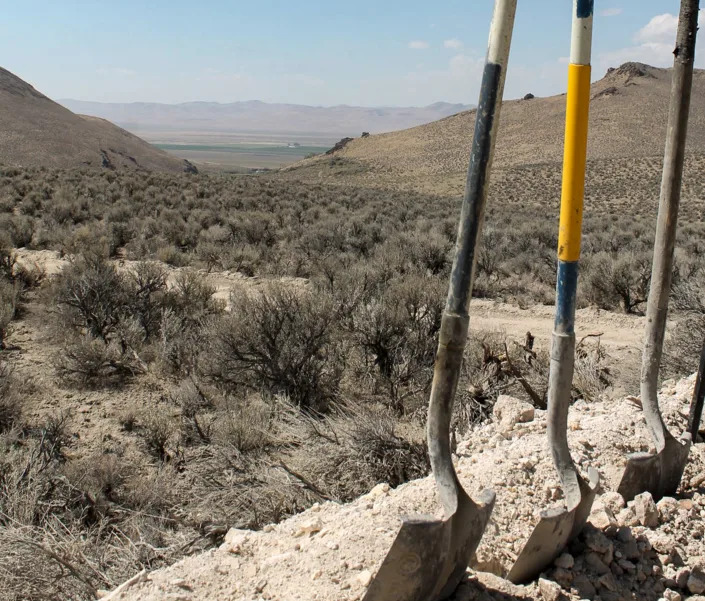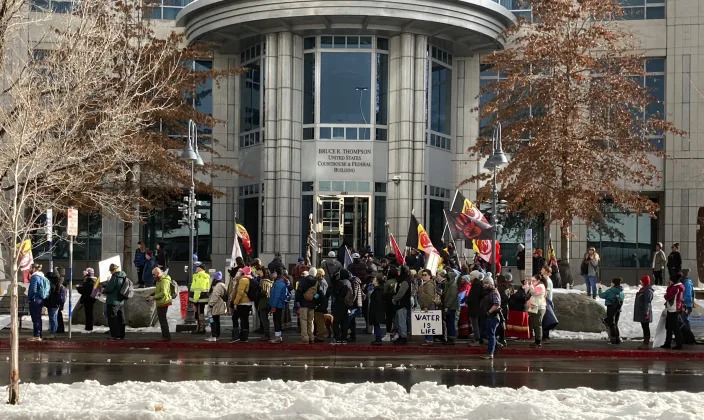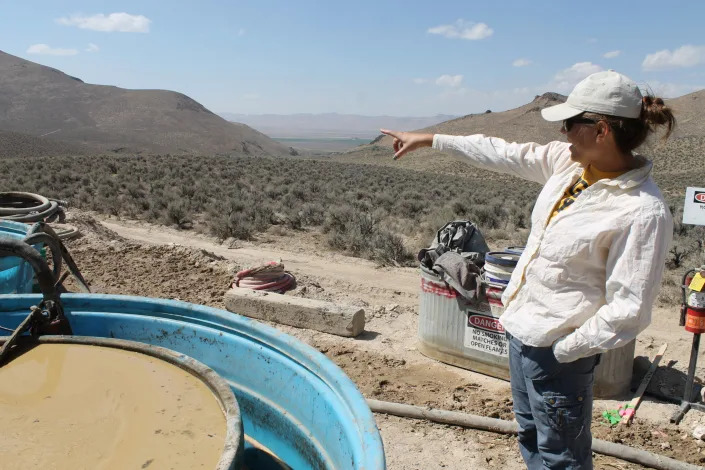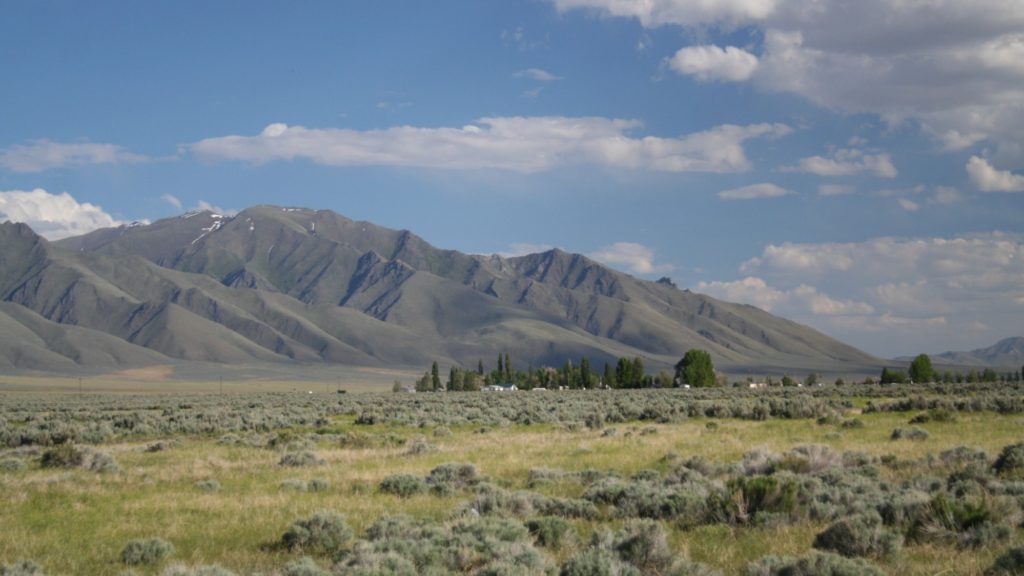Controversial Thacker Pass Mine Gets Permit
U.S. judge handed down a mixed ruling in the highly fraught Thacker Pass lithium mine case.
Darren Thompson
Wed, February 8, 2023

(Photo from the Protect Thacker Pass Facebook page)
RENO, Nev. — A U.S. judge on Monday handed down a mixed ruling in the highly fraught Thacker Pass lithium mine case.
The ruling upheld the Bureau of Land Management’s (BLM) decision to approve the Thacker Pass lithium mine in northern Nevada but ordered the BLM to review the mining claims Lithium Americas, the company developing the mine, has in according with a 19th-century law that governs mining on public lands.
BLM, which issued a permit for the mine in 2020, had faced legal challenges from conservation organizations, a local rancher, and several tribes to stop the project.
U.S. District Court Judge Miranda M. Du wrote in her order on Monday that the court “affirms BLM's decision, rejecting arguments that the Project will cause unnecessary and undue degradation to the local sage grouse population and habitat, groundwater aquifers, and air quality in violation of Federal Land Policy…”
In oral arguments on Jan. 5, 2023, attorneys for the plaintiffs said that BLM failed to fully analyze the mine’s impacts on the environment and did not fully consult with tribes. The court disagreed and cited that BLM reasonably consulted with the Burns Paiute Tribe and Reno-Sparks Indian Tribe.
“We have expected this decision for some time,” Arlan Melendez, Chairman of the Reno-Sparks Indian Colony, said in a statement on Feb. 7. “This does not mean consultation was done correctly and it does not mean this fight is over. We will be continuing to advocate for this sacred site.”
Thacker Pass is called Peehee Mu’huh, or Rotten Moon, in Paiute because, in 1865, federal cavalry killed men, women and children and then left their bodies to rot.
Du wrote in her order on Monday, “None of the tribes who spoke to BLM’s consultant who prepared the Ethnographic Assessment identified the Thacker Pass area as either sacred or a massacre site.”
According to the court order, federal land managers sent letters to consult with the Fort McDermitt Paiute and Shoshone Tribe, the Summit Lake Paiute Tribe and the Winnemucca Indian Colony in December 2019, but BLM did not receive responses before the approval decision was released in 2020.
People of Red Mountain is an Indigenous organization of traditional knowledge keepers and members of the Fort McDermitt Paiute and Shoshone Tribe. They have been opposing the Thacker Mine project since 2021 and say that the lawsuit is a matter of protecting their culture and sites considered sacred to them.
“Federal Justice Miranda Du and her decision with the Thacker Pass lithium mine has just slithered into the malicious patterns of American law and a corporate-priority government,” People of Red Mountain said in a statement to Native News Online. “People of color are not treated with respect and equality in United Corporations of America, and capitalism is the number one threat to our climate future.
“Our hearts are heavy in hearing the decision that Judge Du did not revoke the permits for the Thacker Pass lithium mine. Indigenous Peoples’ sacred sites should not be at the expense of the climate crisis the U.S. faces.”
Last week, Native News Online reported that automaker General Motors is investing $650 million in Lithium Americas if it clears the permit process.
About the Author: "Darren Thompson (Lac du Flambeau Ojibwe) is a staff reporter for Native News Online who is based in the Twin Cities of Minnesota. Thompson has reported on political unrest, tribal sovereignty, and Indigenous issues for the Aboriginal Peoples Television Network, Indian Country Today, Native News Online, Powwows.com and Unicorn Riot. He has contributed to the New York Times, the Washington Post, and Voice of America on various Indigenous issues in international conversation. He has a bachelor\u2019s degree in Criminology & Law Studies from Marquette University in Milwaukee, Wisconsin. "
Contact: dthompson@nativenewsonline.net
Wed, February 8, 2023

(Photo from the Protect Thacker Pass Facebook page)
RENO, Nev. — A U.S. judge on Monday handed down a mixed ruling in the highly fraught Thacker Pass lithium mine case.
The ruling upheld the Bureau of Land Management’s (BLM) decision to approve the Thacker Pass lithium mine in northern Nevada but ordered the BLM to review the mining claims Lithium Americas, the company developing the mine, has in according with a 19th-century law that governs mining on public lands.
BLM, which issued a permit for the mine in 2020, had faced legal challenges from conservation organizations, a local rancher, and several tribes to stop the project.
U.S. District Court Judge Miranda M. Du wrote in her order on Monday that the court “affirms BLM's decision, rejecting arguments that the Project will cause unnecessary and undue degradation to the local sage grouse population and habitat, groundwater aquifers, and air quality in violation of Federal Land Policy…”
In oral arguments on Jan. 5, 2023, attorneys for the plaintiffs said that BLM failed to fully analyze the mine’s impacts on the environment and did not fully consult with tribes. The court disagreed and cited that BLM reasonably consulted with the Burns Paiute Tribe and Reno-Sparks Indian Tribe.
“We have expected this decision for some time,” Arlan Melendez, Chairman of the Reno-Sparks Indian Colony, said in a statement on Feb. 7. “This does not mean consultation was done correctly and it does not mean this fight is over. We will be continuing to advocate for this sacred site.”
Thacker Pass is called Peehee Mu’huh, or Rotten Moon, in Paiute because, in 1865, federal cavalry killed men, women and children and then left their bodies to rot.
Du wrote in her order on Monday, “None of the tribes who spoke to BLM’s consultant who prepared the Ethnographic Assessment identified the Thacker Pass area as either sacred or a massacre site.”
According to the court order, federal land managers sent letters to consult with the Fort McDermitt Paiute and Shoshone Tribe, the Summit Lake Paiute Tribe and the Winnemucca Indian Colony in December 2019, but BLM did not receive responses before the approval decision was released in 2020.
People of Red Mountain is an Indigenous organization of traditional knowledge keepers and members of the Fort McDermitt Paiute and Shoshone Tribe. They have been opposing the Thacker Mine project since 2021 and say that the lawsuit is a matter of protecting their culture and sites considered sacred to them.
“Federal Justice Miranda Du and her decision with the Thacker Pass lithium mine has just slithered into the malicious patterns of American law and a corporate-priority government,” People of Red Mountain said in a statement to Native News Online. “People of color are not treated with respect and equality in United Corporations of America, and capitalism is the number one threat to our climate future.
“Our hearts are heavy in hearing the decision that Judge Du did not revoke the permits for the Thacker Pass lithium mine. Indigenous Peoples’ sacred sites should not be at the expense of the climate crisis the U.S. faces.”
Last week, Native News Online reported that automaker General Motors is investing $650 million in Lithium Americas if it clears the permit process.
About the Author: "Darren Thompson (Lac du Flambeau Ojibwe) is a staff reporter for Native News Online who is based in the Twin Cities of Minnesota. Thompson has reported on political unrest, tribal sovereignty, and Indigenous issues for the Aboriginal Peoples Television Network, Indian Country Today, Native News Online, Powwows.com and Unicorn Riot. He has contributed to the New York Times, the Washington Post, and Voice of America on various Indigenous issues in international conversation. He has a bachelor\u2019s degree in Criminology & Law Studies from Marquette University in Milwaukee, Wisconsin. "
Contact: dthompson@nativenewsonline.net



- Melissa Boerst, a Lithium Nevada Corp. geologist, points to an area of future exploration from a drill site at the Thacker Pass Project in Humboldt County, Nev., on Sept. 13, 2018. A federal judge on Monday, Feb. 6, 2023, ordered the government to revisit part of its environmental review of a lithium mine planned in Nevada but denied opponents' effort to block the project in a ruling the developer says clears the way for construction at the largest known U.S. lithium deposit.
(Suzanne Featherston/The Daily Free Press via AP, File)
SCOTT SONNER
Tue, February 7, 2023
RENO, Nev. (AP) — A U.S. judge has ordered the government to revisit part of its environmental review of a lithium mine planned in Nevada, but denied opponents’ efforts to block it in a ruling the developer says clears the way for construction at the nation's largest known deposit of the rare metal widely used in rechargeable batteries.
The ruling marks a significant victory for Canada-based Lithium Americas Corp. at its subsidiary’s project near Nevada's border with Oregon, and a setback — at least for now — for conservationists, tribes and a Nevada rancher who have all been fighting it for two years. The opponents said they are considering an appeal based in part on growing questions raised about the reach of an 150-year-old mining law.
It’s the latest development in a series of high-stakes legal battles that pit environmentalists and others against so-called “green energy” projects President Joe Biden’s administration is pushing to help speed the nation’s transition from fossil fuels to renewable energy.
The White House says the mine on the Nevada-Oregon line is critical to ramped up efforts to producing raw materials for electric vehicle batteries.
Critics argue digging for lithium poses the same ecological threats as mining for any other mineral or metal in the biggest gold-mining state in the U.S. They say efforts to downplay potential environmental and cultural impacts amount to “greenwashing,”
“We need truly just and sustainable solutions for the climate crisis, and not be digging ourselves deeper into the biodiversity crisis,” said Greta Anderson, deputy director of the Western Watersheds Project, one of the plaintiffs considering an appeal.
U.S. District Judge Miranda Du in Reno concluded late Monday that the opponents had failed to prove the project the U.S. Bureau of Land Management approved in January 2021 would harm wildlife habitat, degrade groundwater or pollute the air.
She also denied — for the third time — relief sought by Native American tribes who argued it could destroy a nearby sacred site where their ancestors were massacred in 1865.
In her 49-page ruling, Du emphasized deference to a federal agency's approval of such projects. But she also acknowledged the complexity of laws regulating energy exploration under a recent U.S. appellate court ruling she adopted that could pose new challenges for those staking claims under the Mining Law of 1872.
“While this case encapsulates the tensions among competing interests and policy goals, this order does not somehow pick a winner based on policy considerations," Du warned in the introduction of her verdict.
Other projects that face legal challenges in U.S. court in Nevada include a proposed lithium mine where a desert wildflower has been declared endangered, and a proposed geothermal power plant on federal land near habitat for an endangered toad.
Last week, General Motors Co. announced it had conditionally agreed to invest $650 million in Lithium Americas in a deal that will give GM exclusive access to the first phase of the Thacker Pass mine 200 miles (321 kilometers) northeast of Reno. The equity investment is contingent on the project clearing the final environmental and legal challenges it faces in federal court.
“The favorable ruling leaves in place the final regulatory approval needed in moving Thacker Pass into construction,” Jonathan Evans, Lithium Americas’ president and CEO, said in a statement Tuesday. The company expects production to begin in the second half of 2026.
Du handed a partial victory to environmentalists in agreeing that the Bureau of Land Management had failed to determine whether the company had valid mining rights on 1,300 acres (526 hectares) adjacent to the mine site where Lithium Nevada intends to bury waste rock.
But she denied the opponents’ request to vacate the agency’s approval of the overall project’s Record of Decision, which would have prohibited any construction from beginning until a new record of decision was issued.
Environmentalists clung to the lone part of her decision favorable to them. That part incorporates a recent ruling by the 9th U.S. Circuit Court of Appeals in a fight over the Mining Law of 1872 in a case in Arizona that could prove more onerous to mining companies that want to dispose of their waste on neighboring federal lands.
The San Francisco-based appellate court upheld an Arizona ruling that the Forest Service lacked authority to approve Rosemont Copper’s plans to dispose of waste rock on land adjacent to the mine it wanted to dig on a national forest southeast of Tucson. The service and the Bureau of Land Management long have interpreted the mining law to convey the same mineral rights to such lands.
“It’s disappointing that the BLM and the Biden Administration can’t see through the greenwashing," Wildland Defense's Katie Fite said Tuesday.
SCOTT SONNER
Tue, February 7, 2023
RENO, Nev. (AP) — A U.S. judge has ordered the government to revisit part of its environmental review of a lithium mine planned in Nevada, but denied opponents’ efforts to block it in a ruling the developer says clears the way for construction at the nation's largest known deposit of the rare metal widely used in rechargeable batteries.
The ruling marks a significant victory for Canada-based Lithium Americas Corp. at its subsidiary’s project near Nevada's border with Oregon, and a setback — at least for now — for conservationists, tribes and a Nevada rancher who have all been fighting it for two years. The opponents said they are considering an appeal based in part on growing questions raised about the reach of an 150-year-old mining law.
It’s the latest development in a series of high-stakes legal battles that pit environmentalists and others against so-called “green energy” projects President Joe Biden’s administration is pushing to help speed the nation’s transition from fossil fuels to renewable energy.
The White House says the mine on the Nevada-Oregon line is critical to ramped up efforts to producing raw materials for electric vehicle batteries.
Critics argue digging for lithium poses the same ecological threats as mining for any other mineral or metal in the biggest gold-mining state in the U.S. They say efforts to downplay potential environmental and cultural impacts amount to “greenwashing,”
“We need truly just and sustainable solutions for the climate crisis, and not be digging ourselves deeper into the biodiversity crisis,” said Greta Anderson, deputy director of the Western Watersheds Project, one of the plaintiffs considering an appeal.
U.S. District Judge Miranda Du in Reno concluded late Monday that the opponents had failed to prove the project the U.S. Bureau of Land Management approved in January 2021 would harm wildlife habitat, degrade groundwater or pollute the air.
She also denied — for the third time — relief sought by Native American tribes who argued it could destroy a nearby sacred site where their ancestors were massacred in 1865.
In her 49-page ruling, Du emphasized deference to a federal agency's approval of such projects. But she also acknowledged the complexity of laws regulating energy exploration under a recent U.S. appellate court ruling she adopted that could pose new challenges for those staking claims under the Mining Law of 1872.
“While this case encapsulates the tensions among competing interests and policy goals, this order does not somehow pick a winner based on policy considerations," Du warned in the introduction of her verdict.
Other projects that face legal challenges in U.S. court in Nevada include a proposed lithium mine where a desert wildflower has been declared endangered, and a proposed geothermal power plant on federal land near habitat for an endangered toad.
Last week, General Motors Co. announced it had conditionally agreed to invest $650 million in Lithium Americas in a deal that will give GM exclusive access to the first phase of the Thacker Pass mine 200 miles (321 kilometers) northeast of Reno. The equity investment is contingent on the project clearing the final environmental and legal challenges it faces in federal court.
“The favorable ruling leaves in place the final regulatory approval needed in moving Thacker Pass into construction,” Jonathan Evans, Lithium Americas’ president and CEO, said in a statement Tuesday. The company expects production to begin in the second half of 2026.
Du handed a partial victory to environmentalists in agreeing that the Bureau of Land Management had failed to determine whether the company had valid mining rights on 1,300 acres (526 hectares) adjacent to the mine site where Lithium Nevada intends to bury waste rock.
But she denied the opponents’ request to vacate the agency’s approval of the overall project’s Record of Decision, which would have prohibited any construction from beginning until a new record of decision was issued.
Environmentalists clung to the lone part of her decision favorable to them. That part incorporates a recent ruling by the 9th U.S. Circuit Court of Appeals in a fight over the Mining Law of 1872 in a case in Arizona that could prove more onerous to mining companies that want to dispose of their waste on neighboring federal lands.
The San Francisco-based appellate court upheld an Arizona ruling that the Forest Service lacked authority to approve Rosemont Copper’s plans to dispose of waste rock on land adjacent to the mine it wanted to dig on a national forest southeast of Tucson. The service and the Bureau of Land Management long have interpreted the mining law to convey the same mineral rights to such lands.
“It’s disappointing that the BLM and the Biden Administration can’t see through the greenwashing," Wildland Defense's Katie Fite said Tuesday.
US judge orders waste rock study for Thacker Pass lithium project
Reuters | February 7, 2023 |

The Thacker Pass lithium project in Nevada is the main part of one company as Lithium Americas plans to split in two. (Image: Lithium Americas)
A US judge ordered regulators to reconsider part of the permit approving Lithium Americas Corp’s Thacker Pass lithium mine project in Nevada, though the mixed ruling allows construction to begin and rejects claims that the project would cause unnecessary harm to the environment or wildlife.

Shares of Vancouver, British Columbia-based Lithium Americas rose 9% to $25.52 on Tuesday after the ruling, which was issued Monday evening.
The proposed mine would be North America’s largest source of lithium for electric vehicle batteries and a key pillar in US President Joe Biden’s efforts to wean his country off Chinese supplies of the metal.
General Motors Co signed a $650 million deal last week to help develop the project, an agreement that hinges in part on a positive outcome in the long-running court case.
In a 49-page ruling, Chief Judge Miranda Du of the federal court in Reno, Nevada, ordered the US Bureau of Land Management (BLM) to determine whether Lithium Americas has the right to dump waste rock at the site, just south of Nevada’s border with Oregon.
Du, however, did not vacate a 2021 decision by then-President Donald Trump to approve the mine. The ruling can be appealed.
Much of the US mining industry is ruled by an 1872 law that gives companies wide berth to extract metals on federal lands. However, an appeals court ruled last year in an unrelated case that miners do not necessarily have the right to store waste rock or erect buildings on federal land not containing valuable minerals.
Du ordered the BLM to determine whether roughly 1,300 acres (530 hectares) at the Thacker Pass site where Lithium Americas hopes to store waste rock – a byproduct of the mining process – contains lithium. Federal officials had told the court last month they believe the entire site contains lithium.
Lithium Americas is meeting on Tuesday with the BLM to begin the review, which should take no longer than six months, Chief Executive Jon Evans said in an interview. “There is evidence in the record of lithium mineralization throughout the project area,” he said. “This is an easy fix.”
Site preparation should begin almost immediately, with heavy construction likely to start this summer and last about three years, Evans said.
Du also rejected claims from the Reno Sparks Indian Colony and other Native American tribes that they were not properly consulted about the project and its potential effects on cultural and historical sites.
Representatives for General Motors, the Reno Sparks Indian Colony and several environmental groups did not respond immediately to requests for comment.
(By Ernest Scheyder and Arshreet Singh; Editing by Christopher Cushing, Jamie Freed and Jonathan Oatis)

The Thacker Pass lithium project in Nevada is the main part of one company as Lithium Americas plans to split in two. (Image: Lithium Americas)
A US judge ordered regulators to reconsider part of the permit approving Lithium Americas Corp’s Thacker Pass lithium mine project in Nevada, though the mixed ruling allows construction to begin and rejects claims that the project would cause unnecessary harm to the environment or wildlife.

Shares of Vancouver, British Columbia-based Lithium Americas rose 9% to $25.52 on Tuesday after the ruling, which was issued Monday evening.
The proposed mine would be North America’s largest source of lithium for electric vehicle batteries and a key pillar in US President Joe Biden’s efforts to wean his country off Chinese supplies of the metal.
General Motors Co signed a $650 million deal last week to help develop the project, an agreement that hinges in part on a positive outcome in the long-running court case.
In a 49-page ruling, Chief Judge Miranda Du of the federal court in Reno, Nevada, ordered the US Bureau of Land Management (BLM) to determine whether Lithium Americas has the right to dump waste rock at the site, just south of Nevada’s border with Oregon.
Du, however, did not vacate a 2021 decision by then-President Donald Trump to approve the mine. The ruling can be appealed.
Much of the US mining industry is ruled by an 1872 law that gives companies wide berth to extract metals on federal lands. However, an appeals court ruled last year in an unrelated case that miners do not necessarily have the right to store waste rock or erect buildings on federal land not containing valuable minerals.
Du ordered the BLM to determine whether roughly 1,300 acres (530 hectares) at the Thacker Pass site where Lithium Americas hopes to store waste rock – a byproduct of the mining process – contains lithium. Federal officials had told the court last month they believe the entire site contains lithium.
Lithium Americas is meeting on Tuesday with the BLM to begin the review, which should take no longer than six months, Chief Executive Jon Evans said in an interview. “There is evidence in the record of lithium mineralization throughout the project area,” he said. “This is an easy fix.”
Site preparation should begin almost immediately, with heavy construction likely to start this summer and last about three years, Evans said.
Du also rejected claims from the Reno Sparks Indian Colony and other Native American tribes that they were not properly consulted about the project and its potential effects on cultural and historical sites.
Representatives for General Motors, the Reno Sparks Indian Colony and several environmental groups did not respond immediately to requests for comment.
(By Ernest Scheyder and Arshreet Singh; Editing by Christopher Cushing, Jamie Freed and Jonathan Oatis)
No comments:
Post a Comment